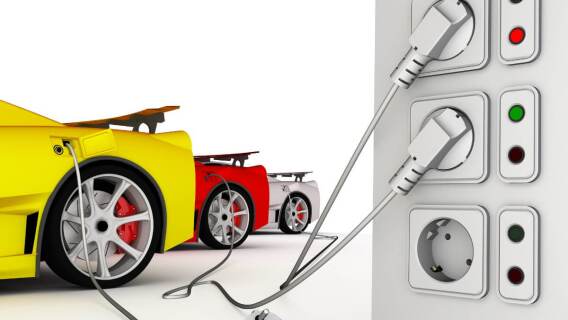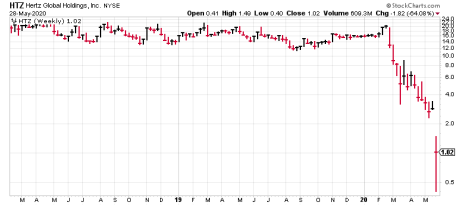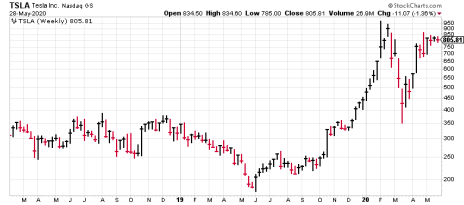The Death of Hertz Stock
Less than two weeks ago, Hertz (HTZ) declared bankruptcy, a victim of the COVID-19 shutdown.
In February, just before the COVID-19 shutdowns began, Hertz stock was trading as high as 20. Now it’s trading around 1.
The problem, of course, is that as the travel industry cratered, cash at Hertz dried up, and in this very asset-heavy business, with 10,000 locations in 20 countries, more than 650,000 vehicles worldwide, and oodles of debt, bankruptcy was never very far away. What is interesting to me is that before the bankruptcy announcement caused Hertz stock to gap down from 3 to 1, it took more than three months for investors to slowly sell the stock steadily down from 20 to 3—as every new buyer thought he was getting a great deal. Turns out none of them were.
[text_ad]
And the biggest loser of all looks like Carl Icahn, who owned nearly 39% of the company and unloaded his shares of Hertz stock last week at the rock-bottom price of 72 cents per share. Ouch.
Whether the company—which includes the brands Dollar and Thrifty—can be rescued is not for me to say. I don’t deal in distressed merchandise; I like growth.
So my main topic today is a look forward into the very possible future, as three revolutionary forces combine to disrupt what was actually a very old (somewhat archaic) industry.
Disruptive Force #1 - Electric Vehicles
Disruptive force number one is the electric automobile industry, which is led by Tesla but includes hundreds of young companies in China as well as the old guard of the automotive industry like General Motors, Ford, Toyota, BMW, Mercedes and Volkswagen. Thanks to massive improvements in battery technology, electric vehicles are now more efficient, better-performing, and cheaper to maintain, so experts are now nearly united in their judgment that electric cars will replace fossil fuel-powered vehicles.
Of course, car rental companies can buy electric vehicles, too, but they can’t so easily take advantage of the other two disruptive forces.
Disruptive Force #2 - The Gig Economy
Disruptive force number two is the gig economy, where assets are owned and used by individuals, not corporations. Today, this economy is led by Uber and Lyft in the vehicle space, where they’ve already crippled the taxi industry, so it doesn’t take a lot of imagination to envision an army of cars owned by private individuals taking a big chunk of the car rental market as well.
Disruptive Force #3 - Full Self-Driving Software
Disruptive Force #3 is Full Self-Driving (FSD) software, which eventually will be capable of driving that individually owned electric vehicle anywhere its paying passenger wants to go—and then driving to its next paying customer (or home), empty!
Obviously, we’re not there yet, but the path is clear, and that’s one reason that Tesla (TSLA) stock has been so strong over the past year. (In fact, it’s up almost 300% since June 2019!)
Competitors
There are competitors in the wings, of course, mainly private companies doing development stage work. And competition is good!
Waymo, which started as a Google project and became a stand-alone company in 2016, has had cars on the road since 2015, so it has millions of miles of real-world experience.
Amazon, which has already ordered 100,000 electric vans from Rivian, last week was said to be in advanced talks to buy Zoox, a self-driving startup that could further reduce the costs of getting packages from point A to point B.
Uber has been testing self-driving cars for years and has millions of miles of experience.
Then there’s Mobileye, a subsidiary of Intel (acquired in 2017) that develops vision-based self-driving and driver-assistance systems, as well as all the legacy automakers (GM, Ford, VW, Toyota, Daimler, etc.) who, in my opinion, are hobbled (like Hertz) by their attachment to old business models and technologies
Tesla’s Advantages
Tesla already sells the most electric cars in the world.
All of its cars sold today come standard with the hardware required for using Autopilot (semi-self-driving) now and Full Self Driving (FSD) in the future—and all of its cars provide data for its ever-improving artificial intelligence network.
Just last week, Morgan Stanley released a report exploring the potential for Tesla as the company pivots from selling cars (volume times price) to generating high margin, recurring software revenue (platform users times monthly revenue). The conclusion: If Tesla can successfully make this pivot, its value multiple will be closer to that of the average software company than an automotive company—and that’s a world of difference. In fact, take a look at CEO Elon Musk’s comments from the third-quarter earnings call:
“The thing that’s really going to, I think, probably just have a profound effect on our financials is like – is high volume and high margin, obviously. And that high margin part comes from autonomy. So do people buy the Full Self-Driving package or not and do they buy it worldwide or only in certain places? For example, our autonomy is not as good in China as it is in the U.S. So fewer people - a very small percentage of people buy the FSD package in China. But as we fix that, then we will see a much higher percentage of people buying. And as we are close to Full Self-Driving, that’s just going to become more and more compelling. So that’s – from a financial standpoint, that’s the real mind-blowing situation, is high volume, high margin because of autonomy.”
Elon Musk, obviously, is always thinking years ahead of everyone else. (That’s his SpaceX rocket that just took two astronauts up to the International Space Station.) So I have no doubt that someday, cars without self-driving software will be as rare as cars with manual transmission today. What is uncertain is who the leading providers of this service will be. Today, Tesla has the lead.
[author_ad]



